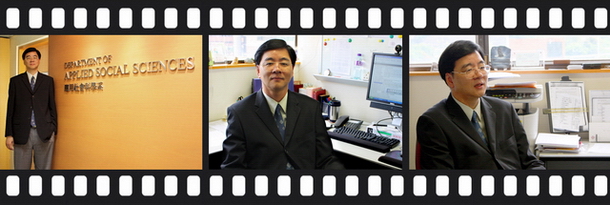
According to surveys, the number of Hong Kong drug abusers under 21 jumped 57 per cent over the past four years, and almost a quarter of the more than 500 secondary schools in Hong Kong have students who have used drugs. Although the HKSAR government set up an inter-departmental task force in 2007 to combat youth drug abuse, the problem continues to worsen and has now become a territory-wide issue.
Professor Daniel Shek Tan-lei, Chair Professor in PolyU’s Department of Applied Social Sciences, talks to Excel@PolyU and analyzes the issue in depth.
Professor Shek, a veteran social work educator and researcher, joined the Action Committee Against Narcotics in 1993 and became Chairman of the Committee earlier this year.
Q : Hong Kong’s youth drug abuse problem is aggravating. Is it because the government’s anti-drug abuse efforts have been misdirected?
Shek : I would say the government has been doing the job quite well. The percentage of young abusers here is actually not very high when compared with those of America, UK or Australia. But it’s true that the number is increasing and there are several reasons behind the trend. Firstly, there is the disintegration of traditional family structure. We are seeing a surge in the number of problem families, for example single-parent families, and they are the source of problem youths who tend to have problem behaviours. The second reason is the normalization of drugs taking. In recent years, some people have been advocating the decriminalization of drugs taking. This school of thought has led many youngsters to regard some traditional concepts, for example “using drugs is wrong”, as being outdated. More and more teenagers regard "snorting K*" as no big deal. The third cause is the lack of proper psychological education for adolescents. Nowadays, young people have to face lots of pressure and they often feel that life is confusing and empty. They don’t know how to handle these sentiments and would easily fall prey to peer pressure and consider drug abuse as an escape from everyday problems.
Of course there are some other catalysts apart from these root causes. Ketamine is getting cheaper and cheaper. One dose now costs less than 20 dollars and people joke that it is cheaper to snort K than to sing K (karaoke). Another factor is that many students have become subtraffickers. They not only use drugs themselves but also persuade other students to try and even sell drugs to them. I guess there are at present 3,000 to 4,000 student abusers. If we don’t act now, I am afraid that drug abuse will soon be common in the universities. We must contain and reduce the problem before it is too late.
Q: What do you think would be the right approach to tackle this problem?
Shek: We must adopt a two-pronged tactic – combating supply as well as reducing demand. The latter means helping the abusers to stay away from drugs and deterring the non-users from taking up the habit. Schools can play their role by cultivating students’ psychological quality as well as their analytical and problem solving ability through counselling and preventive education, for example incorporating “life education” elements in the school curriculum. The purpose is to help them understand that they are not going to solve any problems by taking drugs. And that they don’t need the K-hole experience to find life enjoyable. I believe the Trial Scheme on School Drug Testing can send a clear message to the students – using drugs is not healthy and is illegal.
Q: Why do so many people – educators, social workers, parents and students – oppose the scheme?
Shek: There are bound to be different views, both for and against, when a new initiative is introduced. But I find that some of the objections are based on misconception and misunderstanding. For example the scheme is aimed at identifying students with drug problem, guiding them towards rehabilitation and deterring non-abusers from making a try. But it is criticized as having no respect towards the students and regarded as something devised to punish them. On the other hand, while we have already made it very clear that the scheme is part of a comprehensive strategy, there is still a fallacy that the drug test scheme is going to replace all other anti-drug measures.
Q: Some people questioned why the scheme has to be rolled out amid concerns that there are not sufficient consultation and resources to carry it through. What is your response to that?
Shek: This scheme was originally planned to be a trial run of a proposal. We intended to test it out for six months and have it reviewed upon completion. However, after the spate of drug abuse cases on campus in the last few months, we decided to speed things up. I admit that there is room for improvement in some aspects. That’s why we have been collecting views from various sectors all along so that we can make necessary refinements to the scheme before implementation. I want to emphasize that when we implement public policies, timing is very important. We just can’t keep on discussing without coming to a decision and putting it into practice. We will be able to say whether the scheme is going to work or not after we actually test it out.
Q: Would all these oppositions to the drug test be a blow for the anti-drug campaign?
Shek: I am not worried that disagreements would get in the way of our efforts because most of the issues raised can be solved. As long as the arguments are rational, they will be beneficial to the whole exercise.
*K is ketamine, the most common type of psychotropic substance used by abusers in Hong Kong.
|
